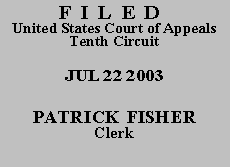

Plaintiff-Appellant,
v.
PAUL MCGARRY, LCSW, Central Utah Correctional Facility, individually; MARK ACKERMAN, Officer, Central Utah Correctional Facility, individually; KELLY SONDROP, LCSW, Central Utah Correctional Facility, individually; DALE CHRISTENSEN, Sargeant, Central Utah Correctional Facility, individually; KEVIN WESTOVER, Lieutenant, Central Utah Correctional Facility, individually,
Defendants-Appellees,
and
FRED VAN DER VEUR, Warden; J. TERRY BARTLETT, DIO; ROBERT JONES, Doctor; PAUL D. LYMAN, Mayor, Sevier, Richfield; MEL COULTER, Lieutenant, Central Utah Correctional Facility, individually; PARM PATRICK, Officer, Central Utah Correctional Facility, individually; MARK
BINKERHOFF, Officer, Central Utah Correctional Facility, individually,
Defendants.
Plaintiff Michael A. Bacon, proceeding pro se, appeals from an order of the district court granting defendants' motion for summary judgment in this case brought pursuant to 42 U.S.C. § 1983. We affirm.
Mr. Bacon brought this action alleging violations of his constitutional rights while he was incarcerated at the Central Utah Correctional Facility. He alleged that defendants committed these violations when he was suicidal. The district court dismissed some of the defendants and claims on the basis that they were duplicative of claims brought in other pending actions against the defendants. The court ordered the remaining defendants, Kelly Sondrop, a clinical social worker at the prison, and Kevin Westover and Mark Ackerman, correctional officers, to file a Martinez(1) report addressing plaintiff's remaining contentions that defendants violated (1) his Eighth Amendment rights by permitting him to possess and swallow razor blades, and by forcing him to suffer inhumane conditions while he was restrained and while he was in the strip cell, (2) his constitutional right of free exercise of religion by denying him religious books and access to clergy, and (3) his constitutional right of access to the courts by not permitting him to send or receive legal mail from the court.
Defendants filed the report and moved that the report be treated as a motion for summary judgment. The magistrate judge prepared a report in which he recommended that defendants' motion be granted as Mr. Bacon had failed to show that defendants (a) were deliberately indifferent to his serious medical needs, (b) had violated his privacy rights, or (c) had violated his right to access to the courts or had personally denied him his right to religious materials and visitors.
On appeal, Mr. Bacon argues that (1) defendants Christensen and McGarry should not have been dismissed, (2) his response to the Martinez report was timely, (3) defendants used false and conflicting testimony in the Martinez report and other filings, (4) defendant Westover did not follow prison regulations while Mr. Bacon was in the strip cell, (5) he has a constitutional right to refuse medication, (6) defendant Ackerman did violate his Eighth Amendment rights, and (7) the Religious Freedom Reformation Act should apply because he filed his case prior to the Supreme Court declaring it unconstitutional. Mr. Bacon asks that this court enter a default judgment against defendants Westover and Christensen.
We review the district court's grant of summary judgment de novo, applying the same legal standard used by the district court. Summary judgment is appropriate if the pleadings, depositions, answers to interrogatories, and admissions on file, together with the affidavits, if any, show that there is no genuine issue as to any material fact and that the moving party is entitled to judgment as a matter of law. When applying this standard, we view the evidence and draw reasonable inferences therefrom in the light most favorable to the nonmoving party.
Burns v. Bd. of County Comm'rs, 330 F.3d 1275, 1280-81 (10th Cir. 2003) (quotations and citations omitted).
Defendants point out that Mr. Bacon failed to raise any of the issues he argues here in his response to the magistrate judge's report and recommendation. We agree that Mr. Bacon is precluded from appealing his issues under this circuit's firm waiver rule, which holds that a party's failure to raise objections to the magistrate judge's report and recommendation bars the party from arguing those issues on appeal unless the ends of justice so require. See Talley v. Hesse, 91 F.3d 1411,1412-13 (10th Cir. 1996).
Our review of the record and Mr. Bacon's arguments on appeal shows that the record does not support the ends-of-justice-exception as the arguments are without merit. The judgment of the United States District Court for the District of Utah is AFFIRMED for substantially the reasons stated in the magistrate judge's report and recommendation of May 14, 2002, as adopted by the district court in its order of August 12, 2002. Plaintiff's motion for leave to proceed on appeal without prepayment of costs and fees is granted. Mr. Bacon is reminded that he remains obligated to make partial payments as provided in 28 U.S.C. § 1915(b)(1). The mandate shall issue forthwith.
Entered for the Court
Circuit Judge
*. This order and judgment is not binding precedent, except under the doctrines of law of the case, res judicata, and collateral estoppel. The court generally disfavors the citation of orders and judgments; nevertheless, an order and judgment may be cited under the terms and conditions of 10th Cir. R. 36.3.
1. Martinez v. Aaron, 570 F.2d 317, 319 (10th Cir. 1978).